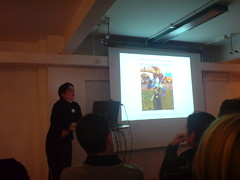SMS and IM on mobile
October 24, 2006 | CommentsI was chatting to a guy from a Big Operator yesterday, and during a chat about SMS and instant messaging he mentioned something I'd never considered: the impact of presence on radio networks.
Consider a typical user who has 10 calls a day and receives 10 text messages; this activity results in his handset being contacted on the local network 20 times in a day (my operator chum referred to these contacts as "pages"). Now consider what happens if this user has 10 buddies in an IM list and is alerted whenever they drop offline or come online: suddenly the number of pages rises to hundreds per day.
This rise impacts both battery life of the device itself, and traffic on the radio network. The operator in this case did a couple of studies and experiments which confirmed this scenario, and in fact painted a gloomier picture around networks collapsing once IM-enabled users hit a certain (low) threshold.
This says to me that IM in its current form won't threaten SMS revenues for a good few years: a bit like Wi-Fi, whilst we can see it starting to creep in at the edges, it's not ready for mass adoption and won't scale up in the way that SMS on current GSM/3G networks does.
What are possible solutions? Limit the number of presence-aware contacts in individual address books, to reduce the network effects of all those presence updates; allocate a new radio channel for presence information (but that'll take 5-10 years to sort out); and IM vendors optimising their products to be sensitive to the needs of mobile networks could help a little - in the short term. And of course, if unchecked IM threatens operators abilities to offer their core services - voice and text - over their networks, then we can expect to see them clamp down on it (presumably taking a fair amount of flak from the lets-replace-operators-with-wifi brigade).
My So-called Second Life: Esther MacCallum-Stewart
October 24, 2006 | Comments My So-called Second Life: Esther MacCallum-Stewart
My So-called Second Life: Esther MacCallum-Stewart
Looking at MMORPGs in the way that normal players do. They've become really big business. Interest is predicted to outstrip film and video - presence in virtual worlds is a good way to reach a new audience.
Social groups can meet in themed areas: this is easier sometimes online than in the real world, for instance with religous groups. Researchers researching inside the world they're researching!
Lots of people in online games want sex. On a base level this means entertainment needs to recognise that these are communities: different people doing different things. Traditional gaming is about single-person narratives, nowadays it's about collective action.
MMORPGs and Virtual Worlds aren't the same thing. WoW is a game based on a genre with quests and tasks - stories are created by game designers. Second Life is a malleable world, with stories created by players. Second Life is "MSN with legs". It's about giving players the tools to make their own games.
There is no typical gamer any more. Games are being written for stereotypical gamers nonetheless. WoW is gripping partially because it's easy to play. "Deviant play needs to be encouraged".
Looking and being clever within a virtual world is becoming as important as owning stuff. Users don't want to be in a game, they want to be a part of society. Users want a degree of choice in what they do. Entertainment in these worlds is something players will choose to do, not be forced to do. Talks about Kurt Vonnegut giving a speech in Second Life.
Players want agency within these worlds (which I'd say is the same that people want in the real world): the ability to affect the contents of a world, to leave their mark. Characters can be played by different people and therefore get a continuity - cf Bert Fry from the Archers (cheers Est ;))
"Virtual Grandma": lots of grandmas want to speak to their families more than they can. They can meet in a virtual world, more than they can in real life. If you can make virtual communication easier and not patronising, they'll use it.
Humanity always seems to subvert games: we're all game players. Deviant play is finding cheats, overacting (e.g. troll player talking trollish). Players like coherency in their environment.
Film environments lend themselves to MMORPGS because they're fictional, and have narrative. e.g. Enter The Matrix. But no matter what players did in this virtual world, they couldn't have any effect on the world. Players knew that they weren't Lawrence Fishbourne and weren't that important. Interweaving the narrative of a film and the MMORPG is difficult.
WoW has relatively little agency: there are festivals, etc., but you end up doing the same quests over and over again. There's little individuality, players go off and do the same quests as each other and this doesn't help to give the feel of a coherent environment.
Conclusion: MMORPGs and virtual spaces are different and need to be recognised as such. Game players aren't a minority.
Question from Mike: do you think that involving people more prior to the film will work better?
Answer: Cameron's making an effort to integrate the media.
Question: Where do ARGs sit between the two?
Answer: Lines between the two are getting blurred. Mobile and laptop access will make a difference.
Question from Mike: what sort of creative things are coming out of WoW?
Answer: not everyone wants to play within the tightly constrained environment of WoW. They're making videos, they're role-playing, but this is all based around the game. They're struggling against WoW and trying to use it in all sorts of new and interesting ways. If >200 people meet together in the same place the server crashes. There's probably something midway between the two that we'll hear about in a few years.
Question: What's Deviant Play in Second Life?
Answer: It's not a game, so there is none. There are laws but no rules. E.g. someone decided to firebomb a muslim community within the game and were immediately removed.
Question: In the high street, big brands dominate. Will it all turn into Starbucks?
Answer: No, there's no shortage of land. It's not a zero-sum game. Second Life is about individuality, not conformity.
My So-called Second Life: Roo Reynolds, Metaverse Evangelist
October 24, 2006 | CommentsMy So-called Second Life: Roo Reynolds, Metaverse Evangelist
In 2005: 25% of gamers over the age of 50. 69% heads of American households are gamers. Hence interest from IBM: this is a big business. It's not about young geeky males any more.
Second life has >1m users, 400k logged on in the last 2 months. 8000 concurrently online. An active economy: $500k changing hands daily. It's not a game, it's "a platform for meeting, building, selling, collaborating and exploring". Sounds like an infinite game
Shows off BBC One Big Weekend concert in Second Life: a combination of user-generated content and social network. It's not an isolated experience. Within the game, "prototyping and making something are the same thing.". They did a simulation of the actual tennis play (ball trajectories etc.) from Wimbledon into Second Life... so people could watch the shot from a choice of seating in the game, and talk about it.
He went to a Second Life concert where Ben Folds chopped everyone up with a lightsaber. Apparently this was a lot of fun: but err how do you know it's him?
What's in it for IBM? "We have a lot of meetings and sometimes they're not much fun". They've begun augmenting some of the stuff they do in IBM. They're looking at using this stuff for community events, etc. People get together after a meeting and get together to talk, etc.
L'Oreal have a virtual office and use this as a recruitment tool.
Second Life is like the web mid-90s: yes, porn and gambling-ridden. It's become more commercial as real companies see an opportunity to promote their brand in-world.
Question: what are the revenue streams for IBM in this?
Answer: most of their money comes from services. V-businesses analogous to e-businesses?
I'm not entirely convinced by this - it all feels a bit "in the lab", and maybe I've been desensitised to the whole 3D world avatar thing. I can see it working as part of an escapist game or play, but as a serious tool? Maybe I'm just too old :) But then Esther and co. do exactly this sort of stuff within WoW... is that because it's the best way to do it, or is it just folks who want to communicate finding the path of least resistance towards doing that? The street finding its own use for things... (he said, vomiting slightly)
My So-called Second Life: Michael Smith, MindCandy
October 24, 2006 | Comments MMOs - where are they now and where are they heading?, Michael Smith, MindCandy
MMOs - where are they now and where are they heading?, Michael Smith, MindCandy
There are forms of gaming beyond WoW and Second Life. "You can't make computers cry. Playing against other people is more fun." Text-based MUDs evolved into 3D worlds. WoW has 7m players and has generated 1b revenue for its makers.
Infiltrating other areas of popular culture - e.g. South Park WoW episode.
Habbo Hotel - players get their own rooms, to furnish as they wish. This is a big revenue stream for the makers. Trend: virtual worlds are free to access, upgrades are charged for. Another example: CyWorld, where 90% of the teen-late 20s population is logged on, $300k/day revenues.
Webkinz: looks like it targets younger players: buy a cuddly toy and you get a unique code for a virtual version which you maintain online.
Test Drive Unlimited: MMOOR (Massively [Multiplayer?] Open Online Racing). Sports-based MMOs are going to be hot over the next few years, he reckons.
Huxley by Webzen: FPS, due out before the end of the year.
"Naughty America - The Game". I loved the fact that an MMORPG targeted at adults in the land of the free has to have such a twee name.
Mobile MMOs have promised a lot but not delivered yet. NokiaGame, for instance, showed potential but nothing has emerged. "We're on the cusp of seeing a huge mobile hit."
Virtual Laguna Beach - MMORPG themed around the TV show.
PerplexCity: spills into the real world, using it as a gameboard. Magazine, CDs, classifieds, actors at live events, black helicopters buzzing real-world players, etc. Spilling them over into the real world allows games more interaction with brands. Swords and Sorcery brands have a problem: it's difficult to put a coke banner into the game (I think some would argue this is exactly what players are trying to get away from... ;))
TV causes autism - study
October 23, 2006 | CommentsTV causes autism: "According to the research, heavy TV indulgence before the age of three is clearly associated with an increase in autism. The paper suggests that TV could be a trigger for those with a genetic predisposition toward the condition."
This made me think of Bowling Alone, and its persuasive argument that the rise of TV has contributed to the collapse of community in American culture. Autism on a macro level?